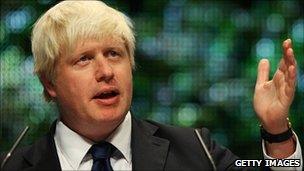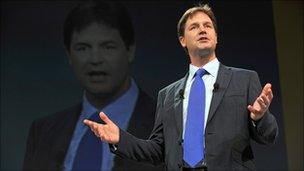Call for extra powers to help North tackle jobs divide
- Published
- comments

Despite the regeneration of Tyneside, the North East lags behind other parts of the country economically
The government is being urged to hand more powers to northern cities and regions to help bridge the economic divide with the south.
New research just released suggests the North of England is lagging behind the rest of the country in key areas.
The data from the think tank IPPR North, external looks at figures for business start-ups, and educational qualifications as well as spending on transport and science and technology.
The North East comes out particularly badly.
The region continues to have the lowest business start-up rate in the country.
In 2009, there were just 5.7 business start-ups per 1,000 of the population, compared to a national average of 7.9. And the region has also seen a 17.5% fall in start-ups since 2004.
Spending per head on transport last year was lower in the North East than anywhere else - £248 per head, compared to £802 per head in London.
And while spending per head on science and technology was £155 in London last year, it was £83 in the North East (although the North West only managed £77).
Economic growth
So what should be done about this? It's hardly a new phenomenon after all.
IPPR North is gathering together the great and good in what they are calling the Northern Economic Futures Commission, external to draw up a 10 year strategy for economic growth in the region.
It includes a mix of people from business, academia, local government and the voluntary sector and is chaired by Geoff Muirhead, external, the former chief executive of Manchester Airport.
He said: "With London, Scotland and the other devolved nations increasingly free to develop their own plans with their own powers, it is time for the North to set out its stall for what it needs to remain competitive in the global economy."

Labour says other cities will suffer if they don't get the same powers as London Mayor Boris Johnson
And IPPR North also wants to see the government give the north extra powers.
It says new economic powers being handed to London Mayor Boris Johnson and to Scotland's Executive could potentially make it even harder for the North to compete.
Ed Cox, external, the Director of IPPR North, said: "In the past the North has looked to London to solve its economic problems but this Commission is designed to allow the North to forge its own future."
Extra powers
And Labour seems to agree. The party has been trying to get the Localism Bill amended to hand England's other cities the same powers being offered to London.
Under the bill, Boris Johnson will get extra powers over housing and regeneration, but nowhere else in England will benefit in the same way.
Labour says that's a mistake.
But is the government likely to listen?
It has of course created Local Enterprise Partnerships of businesses and councils, but so far the jury is well and truly out on whether they will have the money or powers to transform the north.
And the big pot of money for businesses - the Regional Growth Fund, external - is currently doled out by central government under the advice of a committee.
Councils are being offered the chance to keep their business rates, but many in the north are nervous of that because that might be more likely to benefit southern areas that are already economically successful.
And many in the Conservative section of the coalition believe the best approach is to cut red tape to allow businesses to thrive, rather than handing new powers to politicians.
Minister for Cities
But there has been one development of note this week.
The government is forming a ministerial group, external to look at how to promote economic growth in what's known as England's core cities - including Newcastle, Leeds, Sheffield, Liverpool and Manchester.

Deputy Prime Minister Nick Clegg will head up a new group looking at boosting the economies of English cities
It'll be chaired by the Deputy Prime Minister Nick Clegg, and include a new Minister for Cities - the Teesside-born Tory MP Greg Clark, external.
It'll also be advised by Lord John Shipley, external, the former Lib Dem leader of Newcastle Council.
But it all risks sounding a little top-down again, with a group based in Whitehall discussing how those cities can grow.
Of course, those core cities will also get the chance to decide whether they want an elected mayor - and that might eventually see more powers pushed their way.
They are unlikely though to get the same kind of clout as Boris Johnson very soon.
And so although the north can continue to discuss the way forward for the regional economy, any masterplan drawn up by the IPPR's Commission will almost certainly still need to rely on action and support from central government in London.